The Dean of the University of Cape Coast Business School, Professors John Gatsi, has said the cause of conflict and disjoint peace in West Africa could be as a result of weak policies and commitment to deal decisively with all forms of poverty and corruption in the country.
Speaking at the 1st West Africa Peace Dialogue held at the University of Professional Studies in Accra, Prof. John Gasti noted that “job insecurity, politicization of the fight against poverty and corruption create a society where impunity undermines confidence in governance and anti-corruption organizations”.
He emphasized that people who are affected by extreme poverty, exclusion and marginalization can be at peace neither be productive.
Citing insecurity in West Africa, Prof. Gasti said “According to Violence in Africa Report, 2018 by Institute for Security Studies, Between 2014 and 2015, armed fatalities in Nigeria reduced from 10,271 case to 8,987 while from 2001 to 2017, Nigeria ranked 2nd in the number of fatalities in Africa when seven most risky countries to fatalities such as Sudan, DRC, Libya and Somalia were considered non-state-based conflicts dominate in Africa, mostly seeking control over land and natural resource and demanding recognition due to marginalization and exclusion”.
Prof. John Gasti also observed that the high level of poverty and disenchanted youthful population are known for faster internal conflict.
The 1st West Africa Peace Dialogue which was on the theme “Sustaining Regional Peace to Promote Trade, Investment and Development in West Africa” was held in September 20, 2019 in Accra. It was organized by Africa Centre for Peace Building-Ghana, Global Educators for All Initiatives- Nigeria, URI-West Africa and The Emmanuel Ivorgba Foundation.
Below is the full speech of Prof. John Gasti
Theme: “Sustaining Regional Peace To Promote Trade, Investment and Development in West Africa” Keynote Address at the 1st West African Peace Dialogue By Prof. John Gatsi, Esq Dean, School of Business, University of Cape Coast Date: 20th September, 2019 @ UPSA
The theme of the dialogue is clear and provides direct relationship between peace and trade and investment on one hand and on the other hand peace and development.
There is embedded in the theme the assumption that there is peace in West African that needs some efforts to sustain it or that we know the value of peace but have not been able to hold on to it to derive maximum benefits.
We have associated the absent of peace to the number of conflicts, terror attacks and political instability in some countries in West Africa.
The fundamental truth is that conflicts and disjointed peace and peacemaking process in West could be linked to weak policies and commitment to deal decisively with all forms of poverty and corruption in our countries.
Job insecurity, politicization of the fight against poverty and corruption create a society where impunity undermines confidence in governance and anti- corruption organizations.
According to Violence in Africa Report, 2018 by Institute for Security Studies, Between 2014 and 2015, armed fatalities in Nigeria reduced from 10,271 cases to 8,987 while from 2001 to 2017, Nigeria ranked 2nd in the number of fatalities in Africa when seven most risky countries to fatalities such as Sudan, DRC, Libya and Somalia were considered. Non state based conflicts dominates in Africa mostly seeking control over land and natural resource and demanding recognition due to marginalization and exclusion.
Adherence to cogent policies and respect for political, human and economic rights of citizens will provide an environment for domestic and regional trade and investment drive to distribute incomes inclusively. Improvement in income levels and economic rights of people may reduce non state conflicts.
Poor governance, governance with skewed self-appraisals, high level of poverty, marginalization, exclusion and disenchanted youthful population are known to faster internal conflicts. People who suffer from extreme poverty, exclusion and marginalization cannot be at peace neither be productive.
On 18th March 2018, The African Continental Free Trade Area Agreement provides an improved effort at ensuring regional integration which in many years was largely political and economic.
Policy implementation towards financial and monetary integration remains both country level and regional level challenge.
The recent improvements in the movement of people through protocol on visa free and visa on arrival mechanism is subservient to infrastructural deficit challenge and undulating macroeconomic performance.
Disjointed, uncoordinated Financial and monetary policy implementation generated lower but exclusive economic outcomes with downgraded public accountability records.
Only 9% of countries in West trade among themselves in terms of export in recent times while export between ECOWAS countries and Africa as a region was 7%.
Import trade among ECOWAS countries is just 8 % while same with African Region by 2017 was 6% meaning regional and continental integration is weak but in favor of EU recording ECOWAS-EU export of 29% and import of 31%.
Enhanced transport sector infrastructure, improved business environment and trade openness that accommodate transparency may fuel improved infra regional trade.
The implication is that intro regional trade cannot take place by itself, there must be investment to ensure improved multi modal transport network including rail, water transport, and effective air transport systems while regulatory reforms are well coordinated.
Trade openness in which there is quick integration with the 15 landlocked countries in terms of transportation, exchange and deeper diversification of economies to modernize agriculture, enhance energy sector value addition and make use of huge services sector growth in Most African countries.
The African free trade area agreement may not mean much if national investment plans and their incentive protocol do not empower domestic investors.
There is now remarkable legal reform in Ghana’s Companies Act in which the registrar of Companies will have operational offices in the region to moderate the unattractive environment to register Companies to enhance the ease of doing business.
It’s now call for financial and human resource commitment of the government to realize the benefits to Ghanaian investment environment.
Our trade and investment policies should foster technological integration, proper linkage between foreign direct investment and domestic entrepreneurs and enterprises.
Countries in West Africa must intensify policy integration with research institutions which seek to utilize more research products from these institutions in agriculture, fisheries and the environment. Indeed peace, trade and investment should bring about development which is seen in forward looking reforms in how African countries are governed, quality of policies being implemented, quality of life, quality and access to health, dignity of life for children, under privileged, the aged and predictable secured economy for all.
Africa will soon have a population pyramid where the apex is populated with the aged and the base with active and innovative youth with bleak future.
Most African countries are not prepared to handle pension scare, quality infrastructure for the increasing number of people living above 65 years. To secure the future, Africa governments must demonstrate more commitment to issues of children including their education, health, security and opportunities for development.
African countries, used assess their progress not necessarily through the mirror of GDP and deceptive per capital income but through fair opportunities, youth development, policies to address the exclusion of the needs of the aged, how economic management outcomes align with infrastructure for trade, investment and socioeconomic aspirations of citizens.
Harsh macroeconomic realities with limited opportunities don’t make citizens happy. The greatest peace is socioeconomic improvements that border on safe environment, fair opportunities, vibrant industrial sector, and access to shelter, security and assurance of better life at old age. We should build systems that respond to the basic needs of our people.
The extent, to which the public in most African countries mistrust institutions, is a threat to development. The rate at which citizens including one of our reliable pathologists described the recent DNA results regarding the kidnapped Takoradi girls as announced by the policy should worry all of us.
By : Hamida Shawwal / awakenewsroom.com








